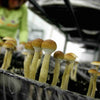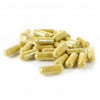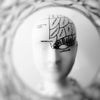Magic Mushrooms and the Psychedelic Renaissance
Recent studies suggest microdosing magic mushrooms can significantly boost creativity and improve cognitive function. What does this mean for mankind?
Could the psychedelic renaissance be upon us?
Psilocybe mushrooms have been used for thousands of years across the world, from ancient Mesoamerica to native Siberia. They are still in use today, with a worldwide market worth over $7 billion dollars. But long before the introduction of LSD, magic mushrooms were one of the most popular psychedelics in the world - now they're coming back out of obscurity and proving themselves as one of our most innovative medicines once again.
Why are we seeing this renaissance of an ancient drug? Cognitive psychologist Dr. David Nichols, who was the lead author on a recent study about microdosing magic mushrooms and creativity, says he believes it's down to people rediscovering their creativity and wanting that sense of flow back. He also believes that one of the reasons there is such a significant rise in young adults seeking psychedelic treatment is due to the way they're living in today's fast-paced world.
"We live in an interconnected, fast paced world and very often we are doing things with insane efficiency," explains Nichols. "And so people feel like they need to do something very different. They feel like they don't want to be in a world where their lives are dictated by efficiency and productivity and doing the most with the least. They want to take a step back and ask what's important."
Nichols explains that people are often looking for some kind of integration - or flow - with their life, and psychedelics provide it. But he doesn't believe that their use is necessarily for recreational purposes; rather, he says, we need to consider them as one of the most important medicines today. After all, studies have shown microdosing can even help treat addiction.
"Magic mushrooms could be a much more important agent than modern antidepressants for providing an integrated process," he told The Telegraph last year.
How do these mystical mushrooms effect our brain chemistry?
The greatest feature of psilocybin is its non-toxic nature and ability to combat depression and anxiety. Studies have shown that just one magic mushroom can effectively help a person suffering from anxiety - just as it benefits people struggling with depression. Aside from easing mental anguish, neurotransmitters in our brain are also released, helping the flow of information within the brain. This is why psychedelics have such a profound effect on our consciousness - they change how we think about life.
Recent studies also show that like mindfulness meditation, or transcendental meditation, psilocybin can help us become more aware of how we think and feel in a way that transcends time and space. For example, a group of researchers in Canada found in their 2015 study that people were able to better recognize and classify real-life experiences when under the influence of psilocybin.
"It is possible that psychedelics facilitate the flexible recategorization of memories, thereby enabling their behavioral reuse," they wrote. Another study from 2014 also found this to be true, suggesting that psychedelics can help us see situations that we might normally not understand, in a new light.
"Our results confirm previous findings indicating an ease in difficult transitions following the use of classic hallucinogens," the researchers noted. "This suggests a potential clinical relevance in addiction and other kinds of disorders marked by social withdrawal and inappropriate behavior.
What is mushrooms role in the psychedelic revolution of medicine?
Researcher and author Dr. Brian Normand, also known as NeuroSoup has been studying the effects of psychedelics on the brain for over a decade. He believes that how we use these fascinating medicines is what will truly determine their role in society.
"Psychedelics, like magic mushrooms, are a unique class of compounds that can dramatically expand our consciousness and our understanding of the universe around us," says Normand. "They do this by allowing us to see things from new perspectives, much like a short vacation from the familiar constraints of day-to-day life. They are powerful medicines and researchers have learned how to harness them to produce far better healing, treatments, and self-exploration than has ever been possible before."
Normand compares psychedelics to a surfboard on the ocean - you can ride it wherever you want. "There is no need for a particular destination but it's the same with the waves," he says. "If you ride it right, it will take you there. But if you sit there and fight the waves or try to keep yourself dry by holding tight to your board, then this is not the goal of this journey. It is the very opposite of it."
This is a different approach to how we use medicine today, according to Normand. Rather than focusing on the destination, these medicines can help us get there in a different way - and more safely.
"The advantage of this approach is that we can make use of the profound insights and understanding that these compounds offer us without getting stuck in our own rigid beliefs," says Normand. "This is something that conventional psychiatric treatment cannot offer. So it will be important for society to find ways to work with psychedelics that empower patients by allowing them to explore new possibilities."
In Conclusion, Normand says that psychedelics are one of the most important tools we have for understanding the human mind, and they can help us better understand emotions and the way we view the world.
"As a result, we can make huge breakthroughs in medicine, science, technology, creativity, spirituality, learning and personal development," says Normand. "This knowledge will ultimately transform our culture."
If you found this article interesting please share it with your friends on Facebook by clicking the button below.







Leave a comment
Please note, comments must be approved before they are published